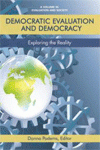
Democratic Evaluation and Democracy
Exploring the Reality
By:
Donna Podems, University of Johannesburg
A volume in the series: Evaluation and Society. Editor(s): Stewart I. Donaldson, Claremont Graduate University. Katrina L. Bledsoe, Education Development Center.
Published 2017
Democratic evaluation brings a way of thinking about evaluation’s role in society and in particular, its role in strengthening social justice. Yet the reality of applying it, and what happens when it is applied particularly outside the West, is unclear. Set in South Africa, a newly formed democracy in Southern Africa, the book affords an in-depth journey that immerses a reader into the realities of evaluation and its relation to democracy. The book starts with the broader introductory chapters that set the scene for more detailed ones which bring thorough insights into national government, local government, and civil societies’ experience of evaluation, democratic evaluation and their understanding of how it contributes to strengthening democracy (or not). A teaching case, the book concludes by providing guiding questions that encourage reflection, discussion and learning that ultimately aims to inform practice and theory.
CONTENTS
Prologue, Donna Podems. Democratic Evaluation and a New Democracy: Acquaintances, Adversaries, or Allies? Donna Podems. A Framework for Identifying Entry Points for International Development Evaluation to Enable Responsive Government Policy, Stephen Porter. How to Democratize Evaluation Practice: A Challenge for Non-Governmental Organizations and Organizations and Donors, Carlisle J. Levine. The Role of the Civil Society Organization in Promoting Democracy: The Case of the South African Monitoring and Evaluation Association, Mark A. Abrahams. Evaluation and Democratic Governance: The Public Management Perspective, Fanie Cloete. How Does Government Evaluation in South Africa Contribute to Democracy? Ian Goldman. Strengthening Democratic Governance in the Building of Integrated Human Settlements Through Evaluations, Matodzi Amisi and Ahmed Vawda. Living the Rainbow: Furthering Education Quality and Democracy Through the Evaluation of Educational Outcomes Using the Annual National Assessment, Benita Williams and Vanessa Scherman. Exploring Economic Development Initiatives and the Link to Democratic Outcomes, Mishkah Jakoet and Alyna Wyatt. Strengthening Government Through Evaluation: The Evaluation Journey of a Provincial Agriculture Department, Dirk Troskie, Kevin Kelly, and Shelton Kaba Mandondo. Paying for Troublemaking: Strengthening Democracy by Institutionalizing Multiple Centers of Evaluation, Terence Beney. Is Government’s Approach to Evaluation Deepening Democracy in South Africa? Dugan Fraser and Patricia J. Rogers. How Can Evaluation Strengthen Democracy? Lehn M. Benjamin. The Teaching Case, Donna Podems. About the Authors.
REVIEWS
"Lehn Benjamin gives an analytical summary of the book in its penultimate chapter and with clarity focuses our attention on core questions—a prelude to the final chapter in which Donna Podems gives a pedagogical rendering of the book—how to use the chapters for “constant comparison.†These contributions realize the greatest promise of case study — as a curriculum. They affirm the inestimable value of the book in our continuing learning about what evaluation is and might be, what it was and might become. The prognostics are not clear and are not all positive. There is as much evidence for us to take away the thought that evaluation is an instrument for “evaluative thinking,†as there is evidence to suppose that evaluation is just too lost in the entwining undergrowth of administrative systems. Where there is a need for democratizing information — where we face the challenge of reducing “information poverty†- evaluation, by the evidence of this book, can both help and hinder. If we take a zero-sum view of power, in order to empower civil society, we have to disempower political and administrative hierarchies; to empower parliament, we have to disempower the executive and its outriders in the state bureaucracy. Here is where evaluation becomes “troublesome.†How much “trouble†can South Africa tolerate? How much trouble can your own context tolerate? Read this book and you will know better." Saville Kushner University of the West of England in American Journal of Evaluation (Read full review)
-
Paperback9781681237886
Web price: $45.04 (Reg. 52.99)
-
Hardcover9781681237893
Web price: $80.74 (Reg. 94.99)
- eBook9781681237909

- EDU037000 - EDUCATION: Research
- EDU011000 - EDUCATION: Evaluation & Assessment
- EDU029000 - EDUCATION: TEACHING METHODS & MATERIALS: General
-
 Disrupting Program Evaluation and Mixed Methods Research for a More Just Society
The Contributions of Jennifer C. Greene
Disrupting Program Evaluation and Mixed Methods Research for a More Just Society
The Contributions of Jennifer C. Greene
-
 Evaluation for a Caring Society
Evaluation for a Caring Society
-
 Growing the Knowledge Base in Evaluation
The Contributions of J. Bradley Cousins
Growing the Knowledge Base in Evaluation
The Contributions of J. Bradley Cousins
-
 Outcome Harvesting
Principles, Steps, and Evaluation Applications
Outcome Harvesting
Principles, Steps, and Evaluation Applications
-
 Practical Wisdom for an Ethical Evaluation Practice
Practical Wisdom for an Ethical Evaluation Practice
-
 System Evaluation Theory
A Blueprint for Practitioners Evaluating Complex Interventions Operating and Functioning as Systems
System Evaluation Theory
A Blueprint for Practitioners Evaluating Complex Interventions Operating and Functioning as Systems
-
 Visionary Evaluation for a Sustainable, Equitable Future
Visionary Evaluation for a Sustainable, Equitable Future

